International Poetry Day Croatia: Non-Croatian Poets about Croatia
March 21, 2021 - In honour of International Poetry Day Croatia, TCN's Ivor Kruljac met with non-Croatia poets to share their views on Croatia through their art.
Since 1999 and the 30th General conference of UNESCO, March 21 is recognized as International Poetry Day. As said by the United Nations official website, the date was dedicated to poetry to celebrate „one of humanity’s most treasured forms of cultural and linguistic expression and identity“, which history remembers practiced in every culture on every continent.
„Poetry reaffirms our common humanity by revealing to us that individuals, everywhere in the world, share the same questions and feelings“, states the UN.
Supporting linguistic diversity and an opportunity of endangered languages to be heard within their communities along with encouragement to bring back the oral tradition of recitals, the promotion of poetry teachings and poetry in the media, as well as connecting this ancient art form with other art forms such as music, painting, and theatre, are all goals of the International Poetry Day. And here at TCN, we want to do our part and connect poetry with what we always struggle to report on: Showing all aspects of Croatia.
To the fans of contemporary poetry, it's no secret that poets today are very much alive, productive, and regularly present their work. If not in books then at poetry events, open-mics, and on social networks – either from their private accounts, blogs, or in groups dedicated to this wordy-art.
We asked non-Croatian poets through social networks and private group chats dedicated to poetry who either visited Croatia or know about Croatia to send us poems about Croatia with a promise that the top 5 will be published and authors presented. Now, to be fair, while the author of this article is a poet, that is far from being a legitimate poetry critic and the rest of the TCN's editorial team (at least to public knowledge) aren't even poets. The idea was to pick the poems based on how it resonates with us as individuals who gave the art a chance. The academic acknowledgment is nice, but resonating with the audience, the everyday people, should be the goal of any art publically displayed, right?
To be honest, there wasn't really any competition as, by the end of the deadline, we received only four poems. Nonetheless, the beauty of these poems and great resonation with TCN was there and we are happy to publish these poems and ranked them, from fourth place to the very best. You can decide for yourselves which poem you like best (and the messages you see in their work), but here the four poems that „knocked on the doors of our mailbox“ (metaphorically, quite poetically, speaking).
#4: „Croatia“ by Jesus McFridge
Poets such as Charles Bukowski and Walt Whitman are very well known by their name, but just as in many other arts, poets are no exception in sometimes preferring to use pseudonyms to present their work while keeping their identity unknown and privacy secured. Such is the author that goes by the name of Jesus Mcfridge. Quite active in a Facebook group Poetry Criticism For Cool Cats, he revealed in his application that he is from California and described himself as a „24-year-old American that watches too much television“. He added that his knowledge of Croatia is limited to the country at the 2018 FIFA World Cup, but he has fallen in love with the Croatia national football team's checkered uniforms. Despite never visiting Croatia, after „Croatia's tragic loss in the 2018 World Cup final“, he found himself also crying just as many Croatians did.
„In this poem, I have attempted to capture the feeling of this tragic loss that we have shared together, despite the vast seas that separate us“ concluded Mcfridge in his application.
His bittersweet poem simply titled „Croatia“ indeed brings some painful memories but presented in a short and funny way allows us to look at the past in a brighter way, bring back smiles, and give us the strength to cheer for our Croatia national team as they prepare for the next trophy hunt.
Croatia
They
Almost won
The world cup
But
Mandzukic scored
An own goal.

Jesus Mcfridge © Jesus Mcfridge
#3 „Daniela's song“ by Christian Sinicco (English translation by Daniela Sartogo)
Christian Sinicco was born in Trieste, Italy, and his poetry is published in various anthologies and magazines and an editor of the magazine Argo with which he has dealt with the widest overview of poetry in the Italian dialect from 2000 to the present day. He published three books of poetry: „Passando per New York“ (Lietocolle, 2005), „Ballate di Lagosta“ (CFR, 2014) and „Città esplosa“ (Galerie Bordas, 2017). He won the first Italian Slam Poetry Championship and served as the president of the slam poetry association LIPS - Lega Italiana Poetry Slam (2013-2014) and is the current vice president of Poiéin. He is also active in a global initiative of slam poets organizing the world slam championship which early results can be followed on Twitch.
He participated in numerous book festivals including four festivals in Croatia: Zagreb Contemporary Poetry Festival, Forum Tomizza (in Umag), Pula Book Fair, and Rijeka Book Fair.
His second book of poetry „Ballate di Lagosta“, translates as Lastovo Ballads and it's actually a preview while Sinicco plans to soon publish the full book dedicated to this beautiful Croatian island on the southern coast.
„I was on Lastovo several times. I know a poet from there, Marijana Šutić and I spent a vacation there with other poets such as Ivan Šamija and Silvestar Vrljić“, said Sinicco in his application where he offered a poem from „Lastovo ballads“ which already seen its presentation on a prestigious literary site Versopolis.
„Daniela's Song“ may not bring out the most visual and most explicit Croatian motives, but the discrete and specific localization of Croatia is there all wrapped in a love poem to touch the heart and help us remember the summer sweethearts and romance in Croatia.
Daniela's song
I.
She talks about how beautiful it is without knowing where to go
perhaps into the water of the sun like her cheek
simply necessary as the wet dream
in a wider galaxy if it can be understood,
she seduces you through valleys and dusty vineyards
with eyes towards the bay with the waterfall:
Za Barje the sign said, and so also barked the dog tied
under the cypress – his teethed mouth was the buried reason
the fishermen had left him there – near a house
covered with ivy and blackberries, in which had grown
an apple tree with sour fruits and roses
that only you will taste:
avoiding the asphalt and dirt road holes you followed Daniela
targeting yourself and the asphyxia of your life
that follows the path to erect the intelligence of the species
that on the concept of work has built its republic of theft,
then you saw her dancing on the beach between the warm rocks
and the boat pulled out of the lobster pot, the fishermen are back:
good and evil are triangles of waves that spread
on the sea towards the two islands where we swam
– the fish are not aware of it,
and so the man under the pine and his child
with the mask, another fisherman with the fishing line,
only you maybe on the petals you bite as the words
II.
after quite a while we are outdoors and eat figs
at dusk time on this meadow
sliced on the wooden bowl,
we take the bread and tear it many times
because paradise is close to the fire
and the village to our left rises white in pink
made with scales like the barracuda
Korčula has no intention to leave our sight
I shouted as my usual self
you lit the candle and made me notice
we are not alone, but you can stay calm
slowly also the hut
and its fire have become attractive
calming the natural tension
of a darkening sky, not preventing us
from tasting the happiness
of a grilled fish, of tomato and capers
you are attractive when you smile
with a glass of water on the lips
too quietly they get up,
wanting to be born in the response they seek outside
the people at the tables next to us, and from the cottage
where they grill they come to clear up
a woman and the cook, as in a ceremonial
we ask for the check with the hands
they will be intertwined when we emerge from the field
toward the parking lot where we’ll get in the car
and head out to the highest point
of a series of bends, before descending to the valley
the vault of stars surprises us
we stop everything, propped on pillows of a land
that is still hot, we’re sure
that the star will fall, and it comes true
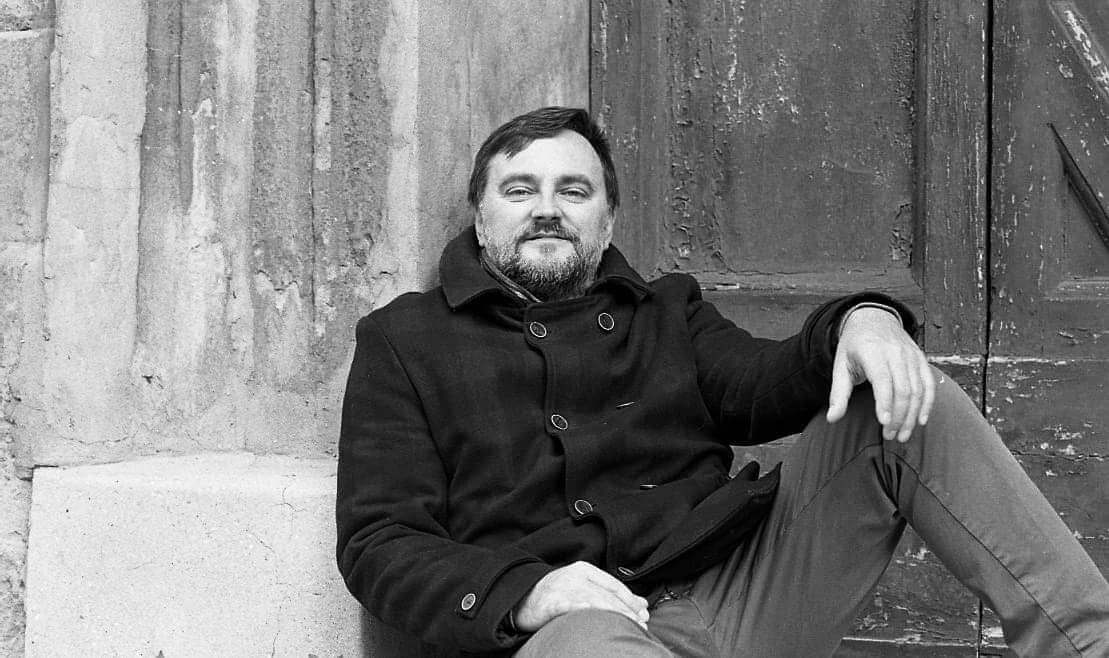
Christian Sinicco © Daniele Ferroni
#2 „The Lakes of Plitvice“ by Vanni Schiavoni (English translation by Graziella Sidoli)
Born in Manduria, Italy, but living in Bologna, Vanni Schiavoni published five poem collections: "Nocte" (1996), "The Suspended Balcony" (1998), "Of Humid and Days" (2004), "Salentitude" (2006), and "Walnut Shell" (2012). He also published two novels "Like Elephants in Indonesia" (2001) and "Mavi" (2019) and edited the poetic anthology "Red - between eroticism and holiness" (2010). Most recently, he also published poetical plaquette „Croatian Notebook“ which features twelve poems dedicated to six Croatian sites: Plitvice Lakes, Kornati, Šibenik, Trogir, Split, and Dubrovnik. Schiavoni wrote the "Croatian Notebook" after a week-long journey in the summer of 2017. His birthplace Manduria is located in the region of Puglia which is 30 miles away from the Pelagosa (Palagruža), the most distant Croatian island, and his surname originates from the name of the Slavonia region in Eastern Croatia.
„For me, it was not just a holiday trip but a journey in and out of everything that I am, a travel diary through which to bring out the game of mirrors between me and that place, between what I am and where I come from and what I have encountered“, said Schiavoni. This journey impacted him with images of the signs of Italy engraved in stone, mournings of the war, communist history („most heretical Communist party in the east in front of the largest Communist Party in the west“, as Schiavoni puts it) and as he added, „the same Adriatic Sea which gives both of us fishes and earthquakes“.
His poem „The Lakes of Plitvice“ is a lovely description of the mixture, the game, and visual eye-candy of the waters in Croatia's oldest National Park, and it linked with a search for bravery and the encouraging point that good and beauty can defeat evil and change it to something better.
THE LAKES OF PLITVICE
The first day they always plunge down into the same spot
the river rapids that come to the encountering
of the white river with the black river
and the more we think ourselves ready with our shrewd eyes
the fewer the adjectives made available to us before that wonder:
the green rush pushes our pupils towards a wild frenzy
it pushes them inside the tearful torrents by our feet
in the shrouded darkness of the sequential caves
and in the vertical caverns sculpted
as if by a hand capable of it all.
Yet Judas must have passed by this place
and though perhaps not the one with burning lips
a simple Judas must have become lost
in this mysterious grid of remorse.
These lakes fall into lakes as lashings on yielding branches
they flow into other waters and so they rain
endlessly
and perfectly untouched.
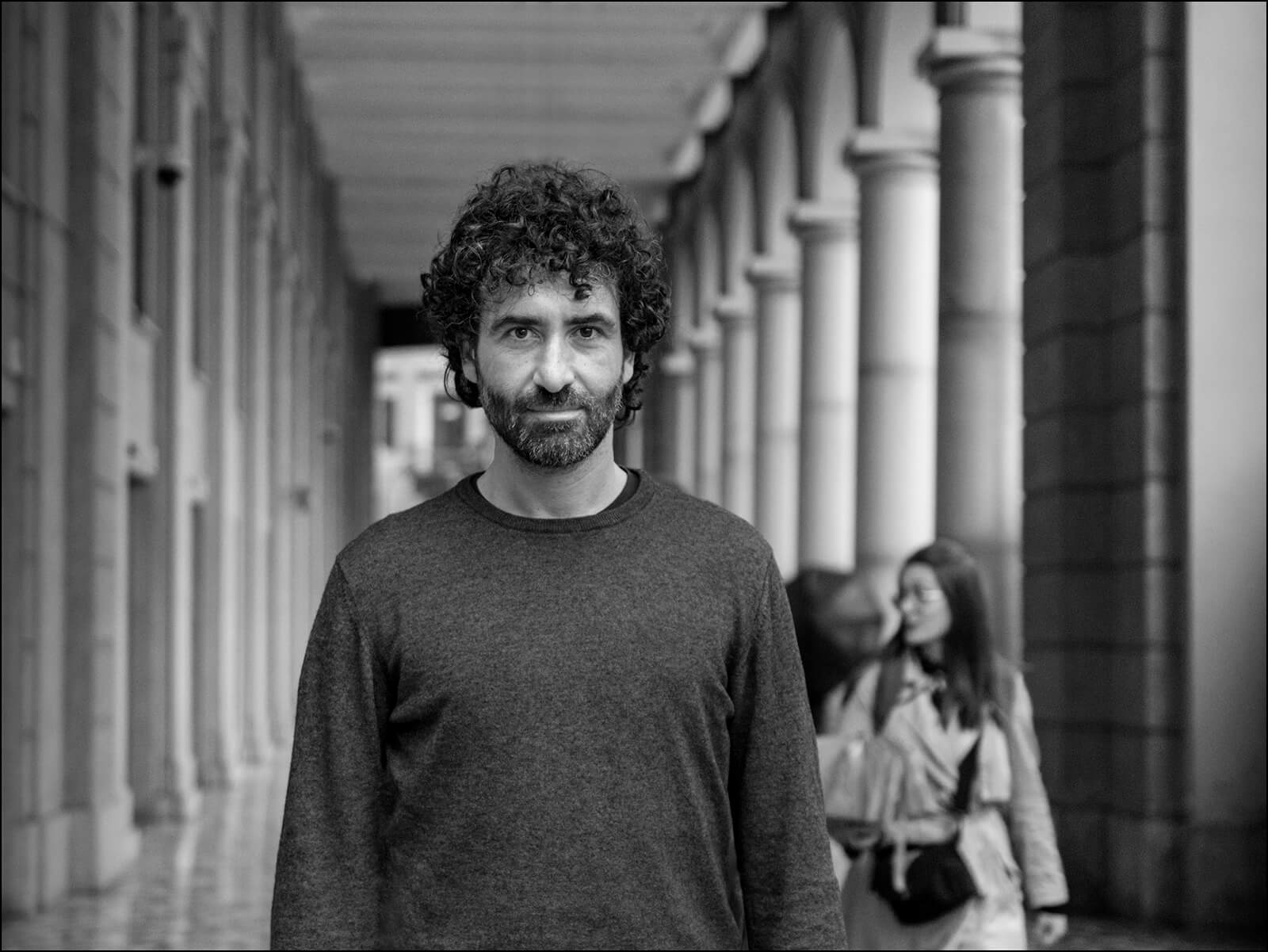
Vanni Schiavoni © Dino Igmani
#1 „Dubrovnik Rock“ by William Vastarella
After Schiavoni and Sinicco, our first-ranked poet is the conclusive evidence there is something so incredible about Croatia it really inspires poetically-inclined neighbors across the Adriatic. Born in Napoli in 1974, William Vastarella is a teacher of Italian Literature, geography, and History. He's has a Ph.D. in semiotics from the University of Bari and writes for several literary and cultural magazines in Italy. He also edited several poetry anthologies as well as semiotic essays. Vastarella visited Croatia several years ago and had a cultural and relaxing holiday on the seaside. „I found her so full of the Mediterranean spirit that I wrote a poem in Italian. I tried to translate it in other words, trying to leave intact the sounds of that memory“, said Vastarella about his poem on Dubrovnik.
The poem „Dubrovnik Rock“ is fantastic in the way, Vastarella visually invokes the images from the history of Dubrovnik (Ragusa) Republic and the relationship it had with Italians at that age with the waves of the Adriatic Sea as the link between Italy and Dubrovnik but also between past and present.
Dubrovnik Rock
Other singers claim to feel
singular vibes in the waves
Nearby this shore,
and so do I.
Ragusa, Dubrovnik
A name is not enough
To trap a soul.
I ask myself
Who’s the other side
Of the other side
As the seawater shuffles.
I touch with my finger
and now I know it’s real
the steel and the wood of the boat
powerful works of man
that wipe out weapons
and I ask no more.
I realize
we have been both
pirates and emperors
centurions and barbarians
through the centuries
each one to the other
a flurry flow
of slavers and Slavs,
slayers and saviors.
Sometimes when the north wind blows,
melting the white in waves,
painting clouds of amazing blues
mirroring the water in the sky,
space seems to become so narrow,
so easy the neighborhood,
then all
the voices of the ancient age
of an ancient game
of thousands lost
in that spot of time,
that spot of sea,
mutate in a mute roar singing
in which merge the rage of riot
and the call for help of a lot
castled in the rock
waiting for a drop of rain to drink
or friend sails on the horizon.
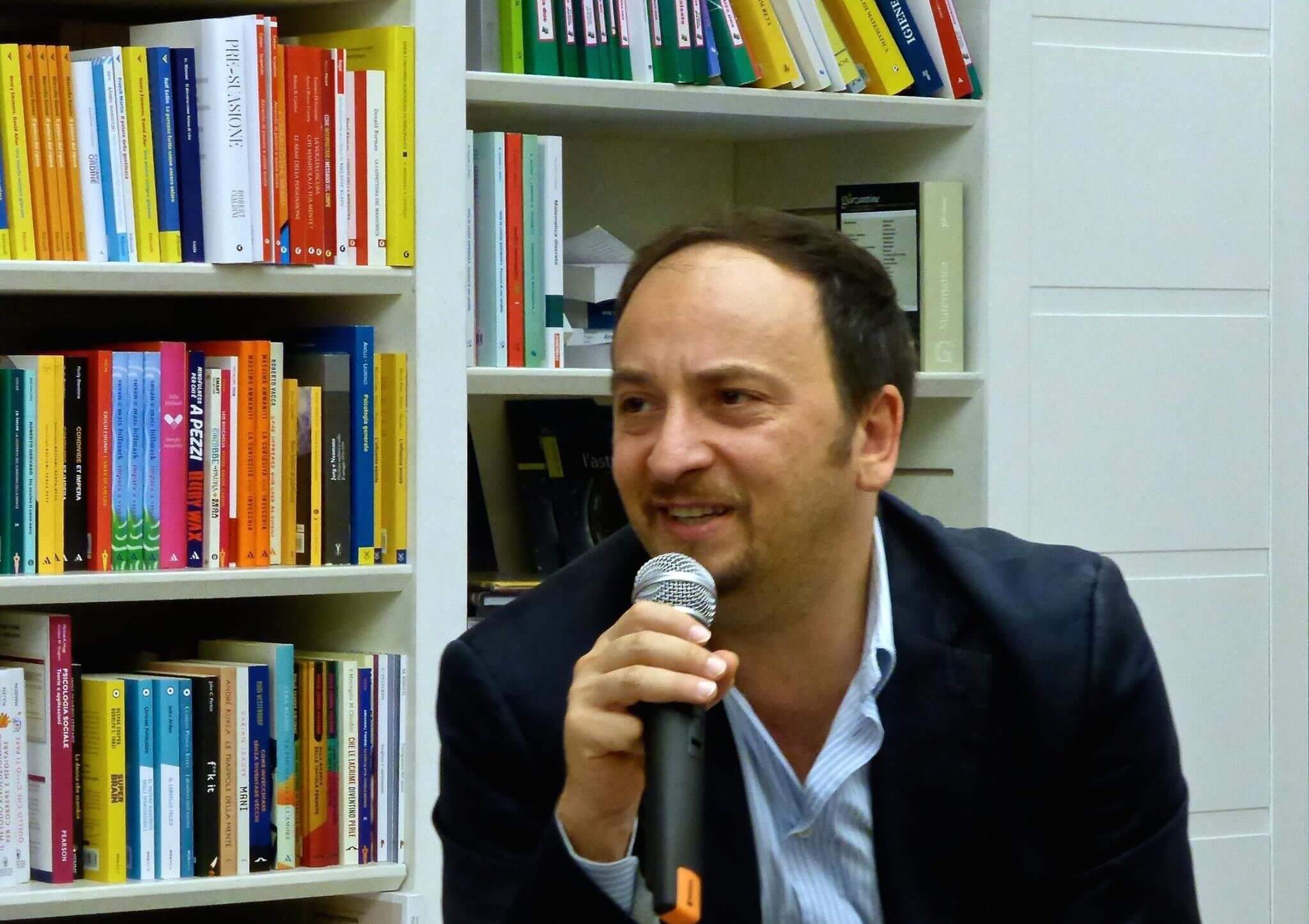
William Vastarella © Vito Signorile
For more about lifestyle in Croatia, follow TCN's dedicated page.
Lastovo Island of Stars Project Being Revived with Astronomical Activities
February 22, 2021 – The Croatian Astronomical Union is reviving the project "Lastovo Island of Stars" by measuring the night sky quality and organizing astronomical activities for citizens and tourists.
After ten years, Dorian Božičević, Secretary-General of the Croatian Astronomical Union, visited Lastovo again. Together with Diana Magdić, Deputy Director of the Lastovo Tourist Board, at whose invitation he arrived, they visited potentially interesting Lastovo locations for astronomical observations and the installation of cameras to monitor Croatian, i.e., the Global Meteor Network's meteors.
Lastovo – Croatia's next dark sky park?
For Lastovo to apply for the International Dark Sky Park status, they agreed on further cooperation to start measuring the night sky quality. Besides, they decided to organize astronomy activities for citizens, tourists, and children.
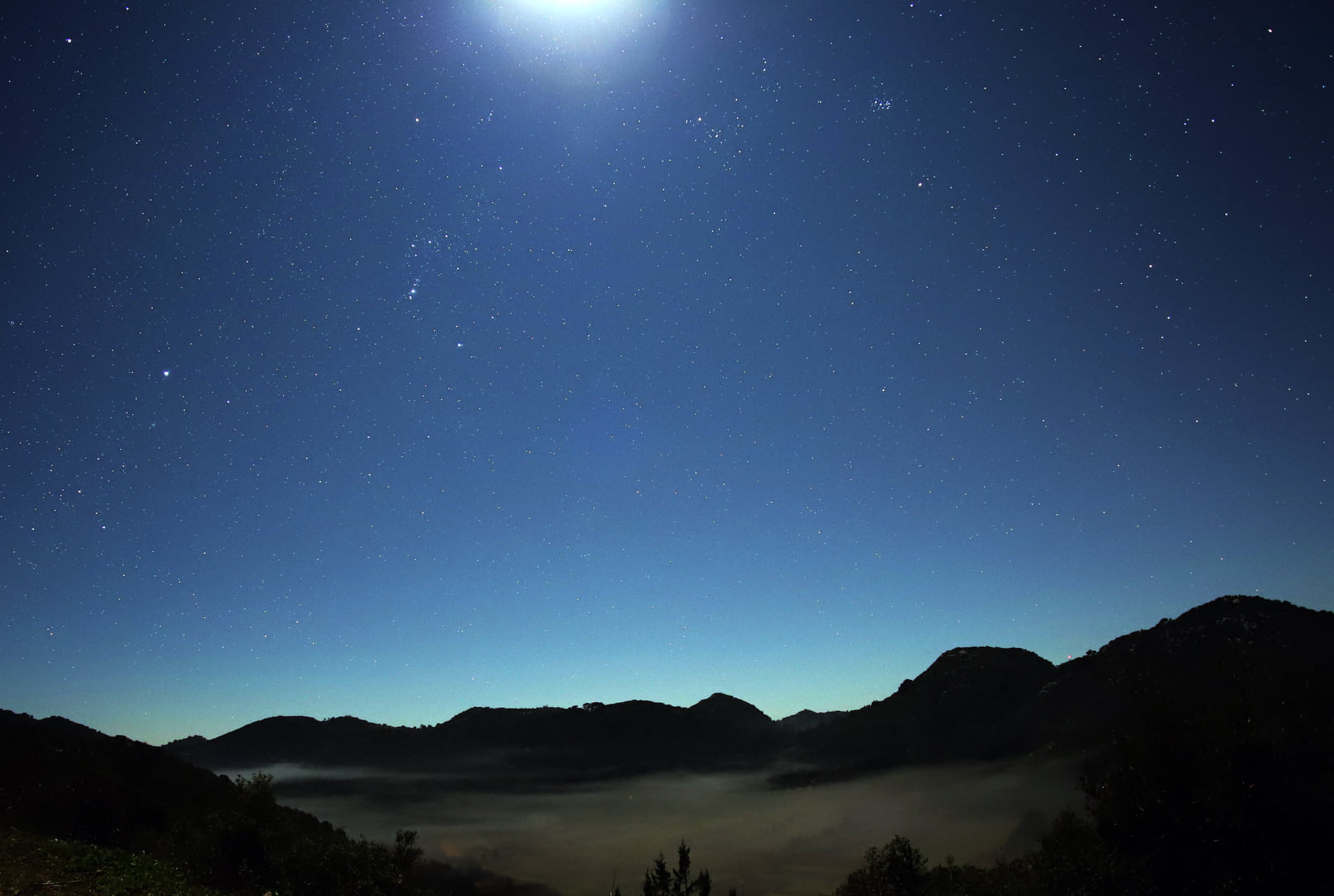
Winter sky over Prgovo / Dorian Božičević, Lastovo Tourist Board
By official definition, the dark sky park label is awarded to protected nature areas with extremely dark skies full of stars. Two places in Croatia hold this label – Petrova Gora in Banovina and Vrani Kamen on Papuk. Also, Jelsa on Hvar is well on its way to becoming the third dark sky park in Croatia, and it seems like Lastovo could potentially be the fourth.
Božičević and Magdić hope for the cooperation of all institutions on the island so that the project "Lastovo Island of Stars" really comes to life. They also plan to hold a meeting with the Lastovo Islands Nature Park's representatives and the Municipality of Lastovo.
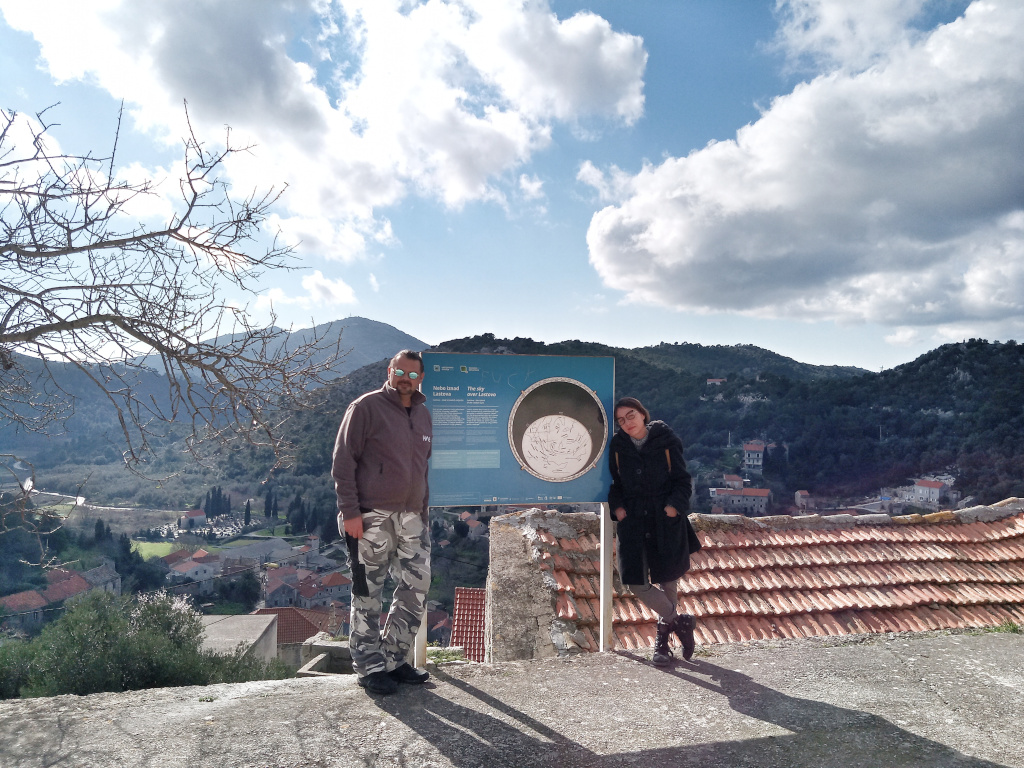
Dorian Božičević and Diana Magdić with a rotating map of the sky in Lastovo / Croatian Astronomical Union
Their goal is to bring astronomy to life in Lastovo's tourist offer and to ensure continuous extracurricular activities in astronomy for children and youth.
First Croatian municipality with ecological lighting
The Croatian Astronomical Union recalled that from 2008 to 2010, the International Conference on Dark Sky Parks had been held in Lastovo. However, due to a lack of financial resources and some other circumstances, the project stalled with development.
At that time, Lastovo began the reconstruction of public lighting. Little is known that Lastovo was the first local government in Croatia with completely ecological lighting, even before the adoption of regulations on protection against light pollution.
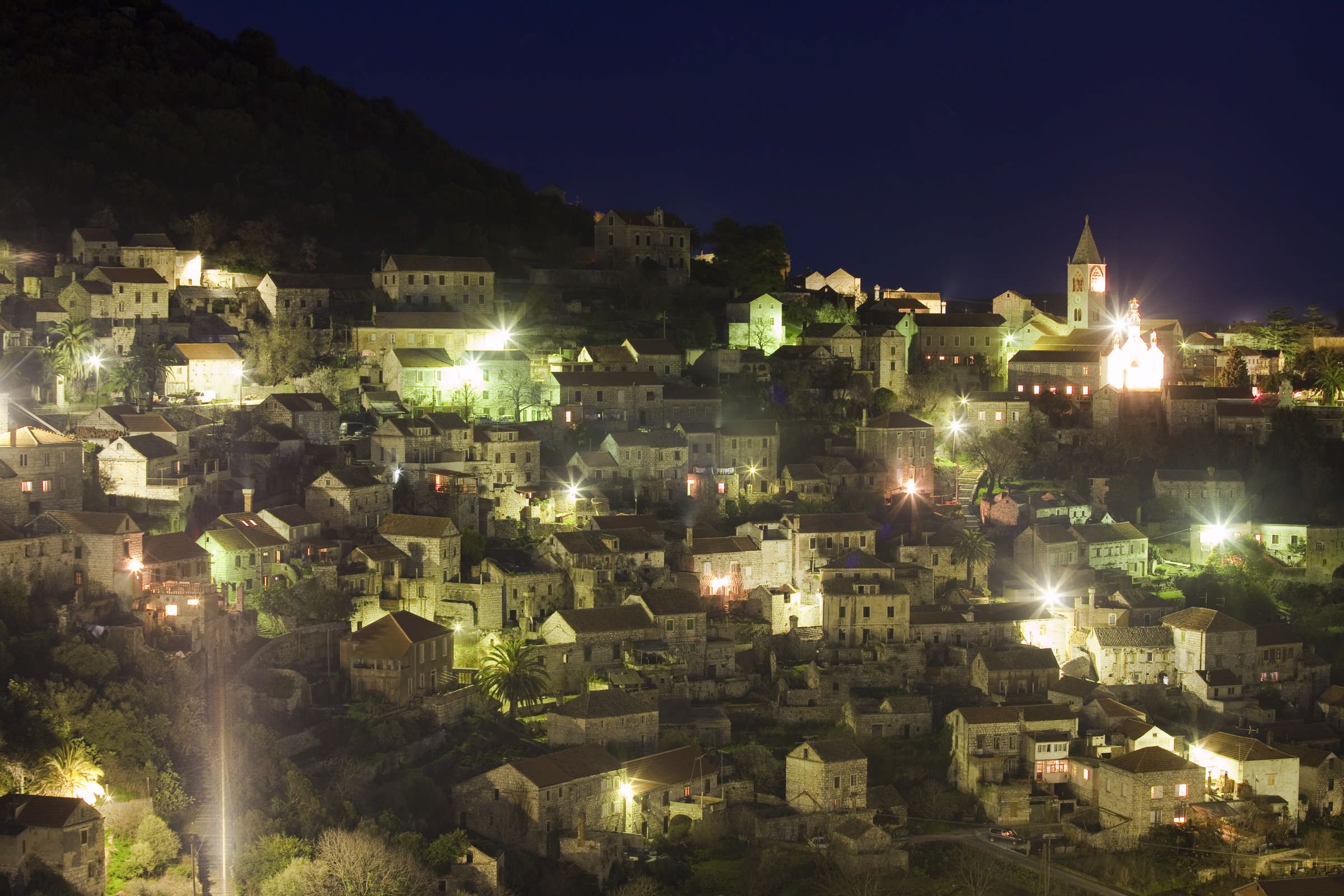
Lastovo / Romulić and Stojčić
In 2010, a workshop in astronomy for elementary school students was organized on Lastovo. Then, the initiative for the establishment of the astronomical society Lastovo was also launched, as well as the initiation of the International Dark Sky Park proclamation.
Stargazing as a symbol of Lastovo
Lastovo is the most distant inhabited Croatian island, and thanks to the distance from the mainland and pollution, stargazing here leaves you breathless.
The town of Lastovo, also the only settlement on the Lastovo island, is an old medieval settlement rich in history. Hills surround it with amazing views of the surrounding fields and the crystal clear sea. In addition to the dark Lastovo sky, the symbol of Lastovo are the richly decorated chimneys, the so-called "fumari," which adorn Lastovo's family houses from the 15th and 16th centuries.
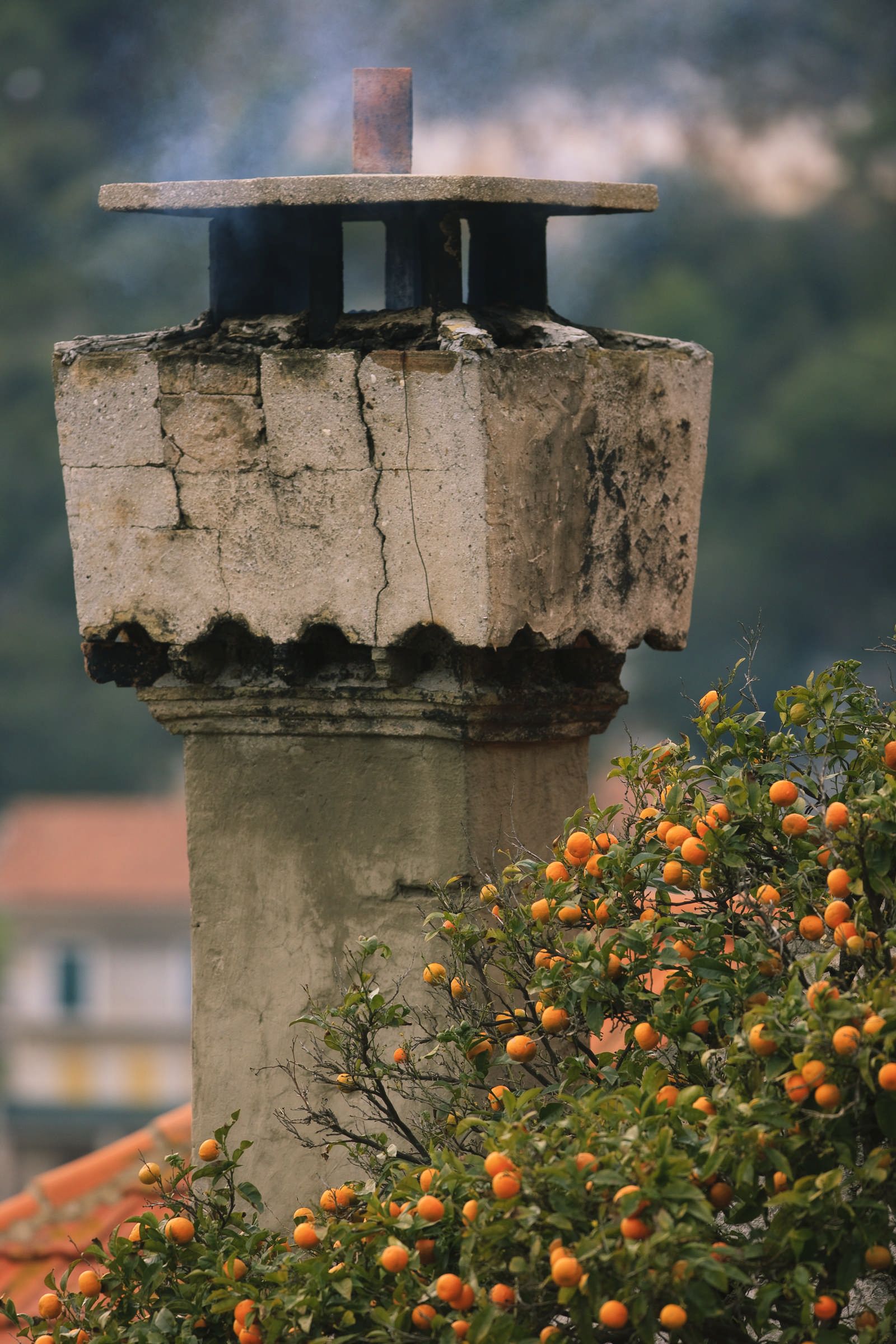
Lastovo's chimney - "fumar" / Romulić and Stojčić
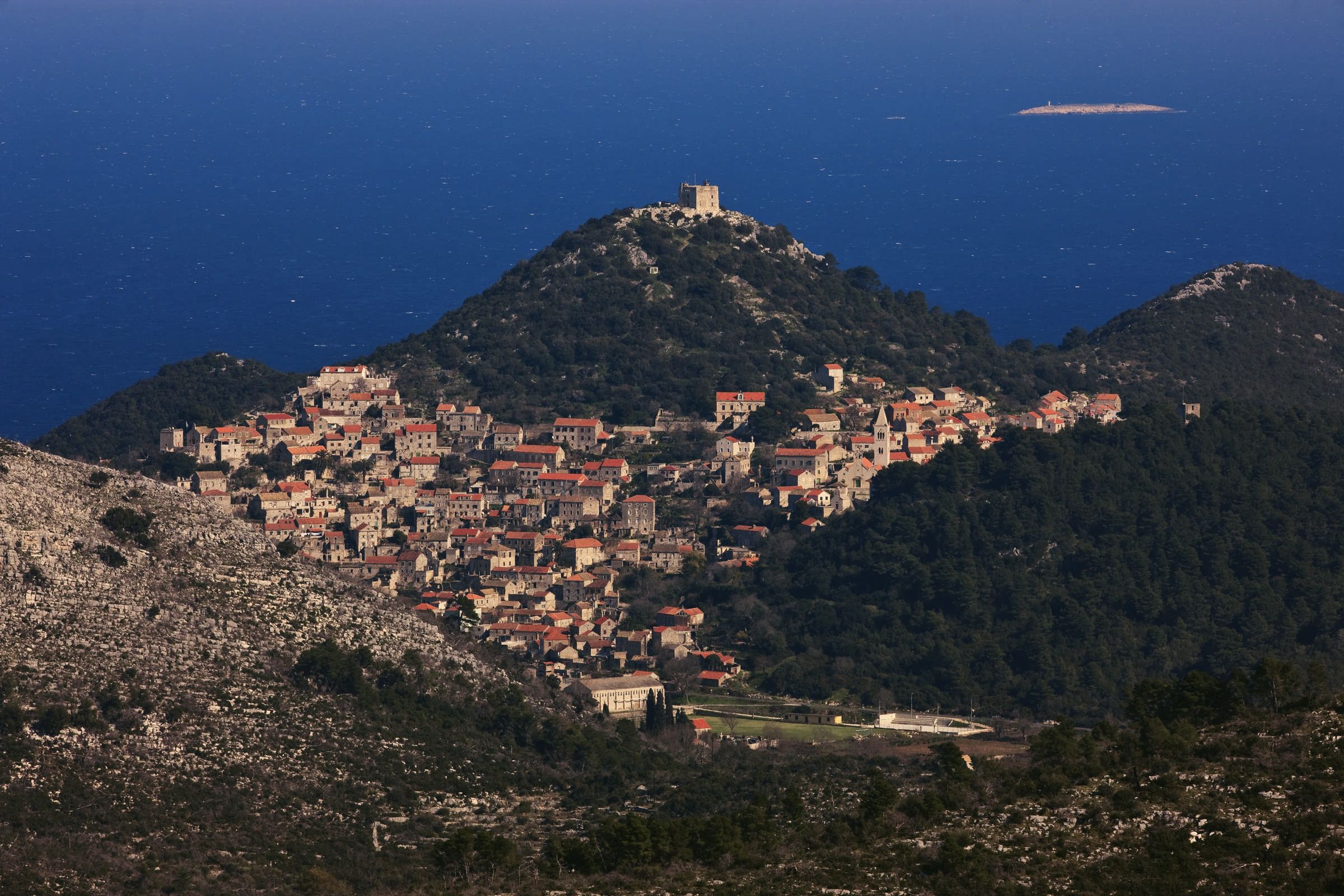
The town of Lastovo / Romulić and Stojčić
For the latest travel info, bookmark our main travel info article, which is updated daily.
Read the Croatian Travel Update in your language - now available in 24 languages.
Lastovo is a Hit! Families and Entrepreneurs Want to Live Here
November 16, 2020 – Despite the ongoing coronavirus pandemic, when tourism and business are significantly affected industries, one Croatian island is gaining popularity in both. Lastovo is a hit.
As Slobodna Dalmacija reports, the island of Lastovo is still a corona-free zone, they had a great tourist season this year, and a baby boom. However, as if those were not compelling enough reasons, in the last two months, Lastovo has recorded the interest of several families with children who would like to settle on the island.
And not only families, but on this Dalmatian island, a few hours away from Split by ferry, several entrepreneurs are interested in starting their own business. This story is confirmed to Slobodna Dalmacija by 26-year-old Don Tonći Ante Prizmić whose arrival on the island, in his first parish, coincides with this interesting and unusual phenomenon.
Why do people want to come to Lastovo? Well, the reason is simple. Besides the favorable conditions, the Church on this island continues to lease agricultural land for ten lipas per square meter. The only condition is that you must stay on the island. In the new normal, some see it as a ticket to a better tomorrow.
Because of that, and also because of the church's million square meters of land, the sum of numerous Lastovo fields, and cheap fertile soil – Lastovo is a hit.
"I agree, Lastovo is a hit. And I am so pleasantly surprised that coming to my first parish accompanies me with such good stories," says Don Tonći, continuing with a story about a family from Imotski who first came on vacation on Lastovo, but then fell in love so much that they expressed a desire to move here and engage in agriculture.
"I asked him if he knows how far we are from the mainland and what our ferry lines are. And he said he knows everything, but that they are serious. The only problem is that it is difficult to buy or rent a house on the island due to unresolved property relations. And there are a lot of houses. But they have a solution for that as well. They say they would put a container on the ground first hand. I told them then to come," says don Tonći.
'We wanted to give people a chance'
Other people also called, mostly young families from the area of Kaštela, Split, Dubrovnik, and even from Zagreb. This was followed by several calls from those who would grow lavender, essential plants, produce oils, and open a healthy pharmacy on church land.
Don Tonći opened the door to everyone, happy that on the island from which the youth must move to the mainland to continue their education, the new youth wants to settle. Lastovo, with its 46 green islands and 46 fields, has many church plots where a lot can be grown.
"We are happy that people are calling us and want to come. The price is not commercial because we wanted to allow people to cultivate the land. It began with the blessing of the bishop, and as we now await the new one, we will acquaint him right away with this noble idea. We have vineyards, pastures, fields, forests, all in different sizes. The problem is that they are not in one plot. Some land plots are 20, 50 meters, and more apart. But it is always possible to arrange a lease with one of the owners so that consolidation can be done. This island is beautiful. The truth is, we are a little further from the mainland. To get to Split, you have to get up at three in the morning to catch the ferry. But it has its charms," Don Tonći considers.
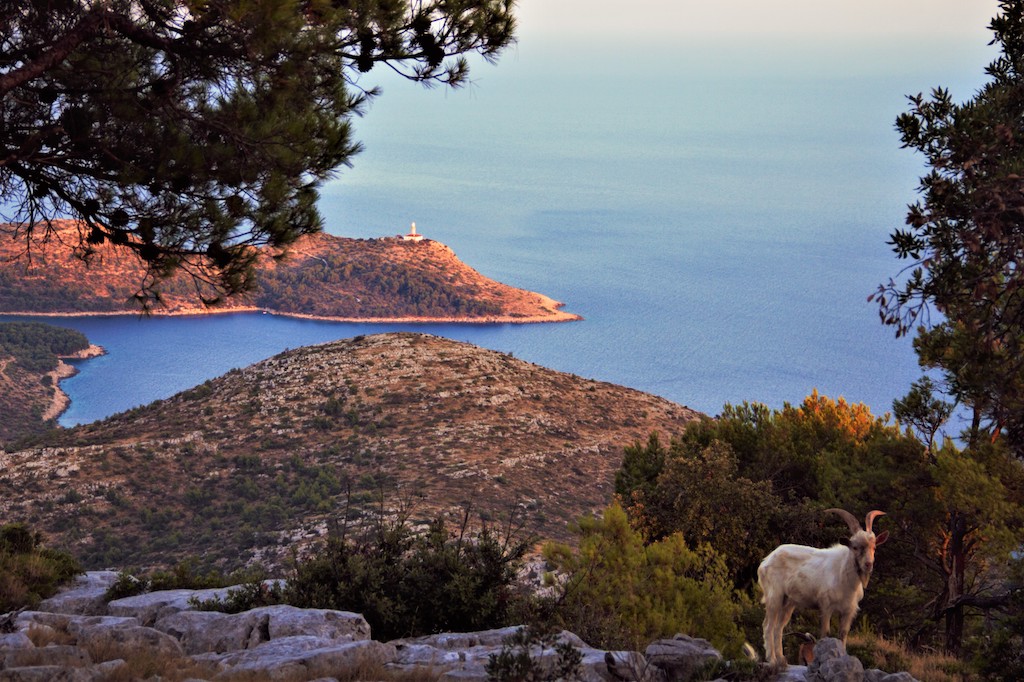
The island of Lastovo / Sara Alduk
Don Tonći is a native of Dubrovnik, and on all of the island, as he jokingly likes to say, he is the only spiritual authority. When he got his first parish, St. Kuzma and Damjan on Lastovo, at first it was a small shock, but he adjusted very quickly. He says that the local people are very open, noble, atypical islanders. They are so strongly attached to each other that an island of 760 inhabitants seems like one big family caring for its members.
"And that's why the interest of those who would like to come here surprised me so pleasantly. I openly showed them what we have – plots of a few hundred to a few thousand square feet, vineyards just waiting for hardworking hands. There are no problems with irrigation either because the dew and nature here do the work themselves. There is a lot of lands, and the locals from Lastovo also rent it. The soil is fertile, soft, well, and gives excellent fruit. We offer you a welcome, so come," says Don Tonći.
Lastovo Statute
Don Stipe Miloš, a former Lastovo priest, explained to Slobodna Dalmacija where the Church got so much land from.
The church land is connected to the Lastovo Statute from the 14th century, according to which each family was obliged to give one-tenth of its annual income to the parish. A third of it went for the needs of the parish, another third as a salary for the pastor. And the third was used for the education of priests. In the 700 years that the Statute has been respected, a lot of lands have accumulated, but also the Lastovo youth has been ordained. And a good part of the estate came through the foundations of fraternities such as Our Lady of the Rosary, the fraternity of St. Anthony, and the fraternity of St. Peter.
To read more about lifestyle in Croatia, follow TCN's dedicated page.
An Island Without Corona: Lastovo Records Zero COVID-19 Cases
October 27, 2020 - One Dalmatian island with 760 inhabitants, a five-hour ferry ride from Split, has not recorded a single coronavirus case since the first was recorded in Croatia back in February. A closer look at why Lastovo records zero COVID-19 cases to this day.
Slobodna Dalmacija asked the head of the Lastovo Civil Protection Headquarters, Margaret Hropić, how the locals managed to achieve zero patients for nine months.
"We have no concrete explanation as to why no corona cases have been reported on the island all this time. We had a busy summer, quite a few tourists, life is the same as in all other areas. People violate and respect measures; there is no different, more special behavior that we practice in our community. We live like the rest of the world. We are a closed environment. Behind us, from a tourist point of view, it is a successful summer. Maybe we have stronger collective immunity. The area of the island is certainly energetically stronger due to the natural environment.
We are grateful to God and hope that He will keep us going. Maybe the explanation lies in some intangible reason; I have room to believe in such an option," Margaret Hropić said.
One of the largest entrepreneurs in Lastovo, Marčelino Simić, the owner of one of the most famous restaurants in the southern part of the waters, and its marina, is almost of the same opinion. This summer, up to 30 yachts could be anchored on its pontoon simultaneously—and three-hundred people circulated in a small space. But what happened? Nothing. Everyone healthy, everything clean, everything tidy. So what's the secret?
"So many people have passed, and did anyone become infected - no, did anyone have a fever - no, did the corona come - no. We had two, three cases of self-isolation, but from our people who came from outside to the island, so they had to go through that measure as well. And everyone was healthy. Why? It is not in the open, my dear, corona; it cannot survive there. There are few people on the whole island on 50 square kilometers. There are another 50 kilometers of water around us; our whole island is a great self-isolation. Care was taken when going ashore; care was taken on the ferry and catamaran. Each of us really cares about who we will stand with then and how we will behave. The neighbor and every peson on the island are taken care of. Because when I take care of them, I take care of everything and myself. And on Lastovo, there is a special energy that keeps us all together," he says.
Furthermore, the island is experiencing a baby boom, with 10 babies this year!
Bruna Rizvanović is among the pregnant women expecting a baby in late January to early February. She will be a mom for the first time.
"I know about five pregnant women; they say that there are about ten of them. It is difficult to count because we are connected by doctors in Split. I share the same day of birth with one. And to put it bluntly, we got pregnant at the same time, in April, May, during the lockdown. Well, the term clearly shows that we didn't really keep a social distance," Bruna laughs.
Her friend Martina Bašić Ivčević from Zaklopatica said that this is not the first time she has been in the center of a baby boom; one already passed ten years ago, when she was pregnant with her second child in a row. She is now expecting her fifth.
"And listen, there was a baby boom during corona. But I think it has to do with cycles, with decades. Now, why don't we have a corona? Big cities - several cases, smaller areas, less. There is nobody here. We follow the rules; we wear masks, don't have big gatherings, and we live. We protect each other. And so, everything runs as normal," concludes Martina.
To read more about lifestyle in Croatia, follow TCN's dedicated page.


